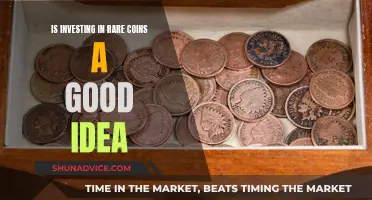
JP Morgan Chase, one of the world's most important banks, has had a chequered history with cryptocurrencies. The bank's CEO, Jamie Dimon, has been a vocal critic of Bitcoin, calling it a fraud and a bubble, and even threatening to fire employees who traded cryptocurrencies. However, in recent years, JP Morgan has softened its stance, with Dimon walking back his criticism and expressing openness to cryptocurrencies if they are properly regulated. The bank has also started to develop strategies to help its clients invest in the cryptocurrency market and has hired a fintech and crypto expert, Oliver Harris, to lead its crypto-assets strategy. With the banking sector facing increasing competition from new financial technologies, JP Morgan is working to stay at the forefront of cryptocurrency and blockchain developments.
| Characteristics | Values |
|---|---|
| Bank | JPMorgan Chase |
| Bank Type | Largest bank in the US |
| Market Valuation | $384 billion |
| Crypto Strategy Head | Oliver Harris |
| Crypto Strategy Head Role | Explore the potential of digital money at the corporate and investment bank |
| Crypto Strategy Head Reporting | Umar Farooq, head of blockchain initiatives |
| Blockchain Platform | Quorum |
| Blockchain Platform Use Case | Clearing and settling derivatives, cross-border payments |
| Blockchain Platform Status | Spinoff being considered |
| CEO | Jamie Dimon |
| CEO Comments on Bitcoin | "Fraud", "Worse than the tulip bubble", "Worth nothing" |
| CEO Comments on Blockchain | "Real", "Like any other technology" |
| CEO Comments on Cryptocurrencies | "Real but not in the current form" |
What You'll Learn

JP Morgan's head of crypto-assets strategy, Oliver Harris
Oliver Harris is a 29-year-old tech star based in London who has been appointed as JP Morgan's head of crypto-assets strategy. In his new role, Harris will be identifying crypto projects for JP Morgan to develop in-house. He will report to Umar Farooq, the head of blockchain initiatives at the corporate and investment bank.
Harris has been running the bank's In Residence fintech program for the past two years. The program identifies and partners with promising fintech startups. Prior to this, Harris worked at the office of British Prime Minister Tony Blair, as well as at the World Economic Forum and at Accenture.
Harris will also lead JP Morgan's Quorum project, the internal blockchain platform developed by the bank that is rumoured to be preparing for a spinoff. He will be identifying and spearheading new crypto projects for the bank, rather than actively trading cryptocurrencies. Harris will look at crypto custody services and how blockchain could work in JP Morgan's payments business.
Harris spoke to Business Insider about how to get ahead at a big bank. He said that "you have to be relentless in the pursuit of your goals" and that mentorship and networking are extremely important. He also added that "one of the key things is actually getting work done" and that "checking yourself and your own personal views is really important".
Using Your Roth IRA to Buy Bitcoin: Is It Possible?
You may want to see also

JP Morgan's blockchain platform, Quorum
Quorum is a private blockchain platform that was developed by JP Morgan Chase in 2016. It was created as a soft fork from Ethereum (ETH), retaining much of its functionality while adding enterprise-friendly features such as transaction privacy, permissioned access, and higher transaction throughput. Quorum is an open-source project that any developer can contribute to, and companies can create their own protected private networks on the platform.
Being based on Ethereum, Quorum has several advantages. For instance, the language used for smart contract development is Solidity, a popular programming language already used by many blockchain developers. Additionally, Quorum allows businesses to create their own tokens and coins, which are automatically compatible with Ethereum's token standards.
In 2019, JP Morgan Chase introduced the JPM coin to facilitate value transfers between companies using Quorum. The JPM coin is a stablecoin pegged to the US dollar and is used for B2B transfers by companies with USD deposits in JP Morgan bank accounts. However, its restrictive nature has been criticised by some in the blockchain community, who argue that it does not meet the definition of a cryptocurrency due to its dependence on USD deposits.
In 2020, JP Morgan Chase sold Quorum to ConsenSys, a Brooklyn-based technology startup and investment company specialising in Ethereum-based solutions. JP Morgan also made a strategic investment in ConsenSys, although the financial terms of the deal were not disclosed. The Quorum team remained at JP Morgan to help with the transition and later work on other blockchain projects.
With the acquisition of Quorum, ConsenSys now offers a full range of products, services, and support for the platform, including digital asset functionality and document management. ConsenSys plans to merge its existing protocol engineering roadmap with Quorum, leveraging the strengths of both codebases. Quorum will remain open-source and interoperable with ConsenSys' other leading blockchain products.
The Ultimate Guide to Buying Bitcoin Investment Trust
You may want to see also

JP Morgan's criticism of Bitcoin
Jamie Dimon, Chairman and CEO of JP Morgan Chase, has been a vocal critic of Bitcoin, calling it a "terrible store of value" as early as 2014 and saying in 2015 that "it will not survive". In September 2017, he called Bitcoin a fraud and threatened to fire any of his staff caught trading or investing in it, comparing it to the 17th-century Dutch tulip mania. He also said that Bitcoin is "worse than tulip bulbs" and that it is "not a real thing".
Dimon's criticism of Bitcoin continued into 2023, when he called it "worthless". However, his views seem to contradict those of JP Morgan Chase, which is looking to tap into rising investor demand for cryptocurrency offerings. For example, in 2023, the bank offered its wealth management clients access to cryptocurrency funds. Dimon has also walked back some of his criticism of Bitcoin, saying in 2024 that he regretted calling it a fraud. He has also expressed optimism about the blockchain technology that underlies Bitcoin, with JP Morgan Chase experimenting with blockchain for several years.
Despite his criticism, Dimon's daughter bought Bitcoin, and he has said that if clients "want to have access to buy or sell Bitcoin, we can give them legitimate, as clean as possible access".
Investing in Crypto: Choosing the Right Exchange
You may want to see also

JP Morgan's involvement in the crypto market
JP Morgan, the largest bank in the US, has had a chequered history with cryptocurrencies. Its CEO, Jamie Dimon, has been a vocal critic of Bitcoin, calling it a "fraud" and a "scam", and threatening to fire employees who traded cryptocurrencies. However, in recent years, JP Morgan has softened its stance and is exploring the potential of digital money and blockchain technology.
In 2018, JP Morgan hired fintech and crypto expert Oliver Harris to head its crypto-assets strategy. Harris's role involves identifying crypto projects for the bank to develop and overseeing the development of its internal blockchain platform, Quorum. Quorum is a private blockchain platform built on the Ethereum protocol, which provides data privacy to companies using the Ethereum network to validate transactions. JP Morgan has considered spinning off Quorum to increase its appeal and accessibility to the markets.
Despite Dimon's criticism of Bitcoin, the bank has acknowledged it as a threat to its business model and has started preparing strategies and products to facilitate client demand for cryptocurrency investments. In an interview, Dimon walked back his comments, expressing optimism about blockchain technology and stating that he is "open-minded" about cryptocurrencies if they are "properly controlled and regulated".
JP Morgan's changing attitude towards cryptocurrencies reflects the growing importance of blockchain technology and virtual currencies in the financial world. The bank is working to remain competitive and keep up with the latest innovations in the industry.
Nas' Coinbase Investment: Millions Poured In
You may want to see also

JP Morgan's CEO, Jamie Dimon's, comments on crypto
JP Morgan's CEO, Jamie Dimon, has had a turbulent relationship with crypto. While the company has been exploring blockchain technology and the potential of digital money, Dimon has been vocal about his scepticism towards cryptocurrencies.
In 2020, JP Morgan debuted its JPM Coin, a blockchain-based token, and the company has since expanded its blockchain initiatives. However, Dimon's comments on Bitcoin and crypto have often been less than favourable. He has called Bitcoin a fraud and a hoax, and even said that he would “shut it down" if he could. Dimon believes that cryptocurrencies have “no intrinsic value” and that the only use case is for criminals and money launderers. These comments were made despite JP Morgan providing access to crypto funds for their wealth management customers.
However, Dimon has also acknowledged the interest of his clients in crypto and has walked back some of his criticism. In a 2024 interview, he said that he is “open-minded” about cryptocurrencies if they are "properly controlled and regulated". He also noted that blockchain technology, which underpins cryptocurrencies, may have a place in the financial system.
In 2022, Dimon's stance seemed to soften further as he recognised the "significant upside" of Bitcoin for investors following a slide in its price. JP Morgan put its price target for the coin at $38,000, indicating a 28% undervaluation at the time. This shift in tone aligns with the bank's growing involvement in the crypto space and its efforts to explore the potential of decentralised finance.
While Dimon's personal views on crypto remain sceptical, JP Morgan continues to dive into the crypto space, recognising the potential of blockchain technology and the opportunities that crypto presents for its clients.
Bitcoin Legality in the US: What You Need to Know
You may want to see also
Frequently asked questions
JPMorgan's CEO, Jamie Dimon, has been a vocal critic of Bitcoin, calling it a "fraud" and a "scam". However, the bank has since softened its stance, with Dimon expressing regret for his previous comments and adopting an open-minded approach to cryptocurrencies.
JPMorgan has developed its own blockchain platform known as Quorum, which provides data privacy and security for companies using the Ethereum network to validate transactions. The bank has also expressed interest in exploring the potential of blockchain to improve its internal processes.
Oliver Harris has been appointed as the head of JPMorgan's crypto-assets strategy, reporting to Umar Farooq, the head of blockchain initiatives at the bank.
Banks face regulatory and legal challenges in entering the cryptocurrency business. Additionally, the custody of digital assets and safeguarding them is a hurdle that needs to be addressed.
Some experts believe that Jamie Dimon understands the potential threat posed by cryptocurrencies to JPMorgan's business model, particularly in the area of offshore banking services. However, with the growing demand from investors and the increasing adoption of blockchain technology, JPMorgan and other major banks are developing strategies to facilitate cryptocurrency investments.







